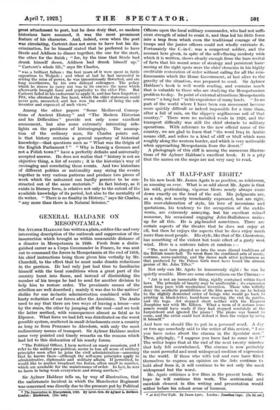GENERAL HALDANE ON MESOPOTAMIA.*
Sin AYLMER HALDANE has written a plain, soldier-like and very interesting description of the outbreak and suppression of the insurrection which brought us within measurable distance of
a disaster in Mesopotamia in 1920. Fresh from a distin- guished career as a Corps Commander in France, he was sent out to command the forces in Mesopotamia at the end of 1910, his chief instructions being those given him verbally by Mr. Churchill, to the effect that he must make drastic reductions in the garrison. He had only just had time to familiarize himself with the local conditions when a great part of the country burst into flame, and instead of diminishing the number of his troops he had to send for another division to help him to restore order. The proximate causes of the rebellion are well described ; mainly it was due to the natives' dislike for our inelastic administration combined with the hasty reduction of our forces after the Armistice. The Arabs used to say that there are two ways of leaving a house—one by the stairs, the other by jumping off the roof—and we took the latter method, with consequences almost as fatal as to Elpenor. What force we had left was distributed on the worst possible system, scattered in small detachments over a country as long as from Penzance to Aberdeen, with only the most rudimentary means of transport. Sir Aylmer Haldane makes some very pointed and timely remarks on the reasons which had led to this dislocation of his scanty forces.
"The Political Officer, I have noticed on many occasions, and I refer to the soldier qua-political, seems to lose all sense of military principles soon after he joins the civil administration—assuming that he knows them—although the self-same principles apply to administrative, diplomatic and military affairs. If permitted, he would like to scatter broadcast the forces, often small in number, which are available for the maintenance of order. In fact, he sees no harm in being weak everywhere and strong nowhere."
Sir Aylmer Haldane tells us, by way of illustration, that the unfortunate incident in which the Manchester Regiment was concerned was directly due to the pressure put by Political
• Ths Imurredion in Mosepotamitt, MO, by Lieut.-Gen. 31r Aylmer I,, lialdsos. /kadOn : Blackwood, i211. not.] Officers upon the local military commander, who had not suffi- cient strength of mind to resist it, and thus led his little force into a trap from which even the traditional courage of the troops and the junior officers could not wholly extricate it. Fortunately the C.-in-C. was a competent soldier, and the account here given, in spite of the self-effacing modesty with which it is written, shows clearly enough from the bare recital of facts that his sound sense of strategy and persistent ham-. mering at the right spots were the chief elements in his highly creditable restoration of order without calling for all the rein- forcements which the Home Government, at last alive to the gravity of the situation, was prepared to send. Sir Aylmer Haldane's book is well worth reading, and contains much that is valuable to those who are studying the Mesopotamian problem to-day. In point of external attractions Mesopotamia comes " a long last " in his experience of many lands. "In no part of the world where I have been can movement become more quickly difficult or indeed impossible for a time than, after a fall of rain, on the slippery argillaceous soil of that country." There were no metalled roads in 1920, and the transport difficulty was still the chief obstacle to military operations. With reference to the new official name of the country, we are glad to learn that "the word Iraq in Arabic means cliff, and refers to a kind of cliff or bluff which runs roughly along the western border, and which is very noticeable when approaching Mesopotamia from the desert."
A photograph of this cliff is among the numerous illustra- tions of Sir Aylmer Haldane's excellent book. It is a pity that the names on the maps are not very easy to read.










































 Previous page
Previous page